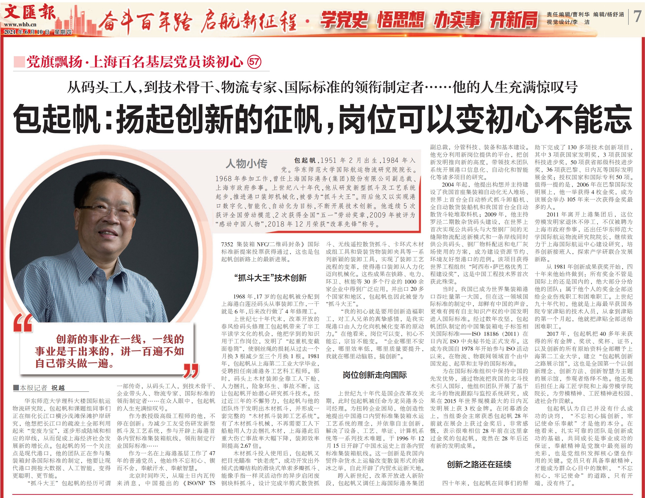At noon on June 9th, Beijing time, news came from the ISO’s Central Secretariat in Geneva, Switzerland that the new international standard proposal ISO/NP TS 7352 Container NFC/QR Code Seal proposed by Bao Qifan from the SEM, ECNU on behalf of China was passed by a vote. The United States, Russia, France, the United Kingdom, Japan, Australia, and Denmark voted in favor of the proposal, showing that China is taking the lead in setting international standards.

Containers are the main transport unit of world trade. Currently, mechanical seals are mainly used in container transportation. Since the mechanical seal number does not have an automatic identification function, it requires that after each installation of the seal, the seal number must be manually recorded and entered. During the transportation process, the seal numbers must be manually checked, which is not only insufficient, but can also be inaccurate and incur high labor costs. Therefore, it is necessary to adopt new technologies to change this situation.
In order to improve the informationization and security of the seal faster, better define the handover responsibility of the container transportation process, and increase the uniqueness, process monitoring, and rapid identification of seals, Bao Qifan’s team proposed a new scheme of using electronic container seals based on the mobile Internet, which uses smart phones to quickly identify and verify container seals and quickly send container-related information to the Internet.
However, the path to reach this new international standard proposal was not smooth. As early as the 2016 ISO/TC104/SC4 Atlanta meeting in the United States, Bao Qifan’s team showed the container NFC seal system to the experts at the meeting, and it was widely affirmed. Bao Qifan noted that while the series of ISO18185 Container Electronic Seals international standards have been published for 10 years, the electronic seals described therein are required to operate at both 433MHz and 2.4GHz frequency bands. Therefore, the use cost is relatively high, and readers need to be deployed in the world on a large scale. As a result, this international standard has not been able to be commercially implemented. Bao Qifan proposed the idea of revising the international standard of electronic container seals for the first time at the meeting.
After more than a year’s struggle and communication with experts from various countries, China submitted the Proposal to Amend ISO18185 to the ISO/TC 104/SC4 Secretariat in December 2017. Although the vote met the requirements, due to various reasons, the work did not proceed.
In November 2019, China submitted a new project proposal Container NFC Seals to the ISO/TC 104/SC4 Secretariat. However, since less than 5 countries participated in the project, the proposal did not pass.
By 2020, Bao Qifan’s team had done a lot of work, discussed technical solutions with experts from various countries through emails and video conferences, and shared Chinese application practices to convince experts. Finally, they got the entry ticket, marking another international transportation standard led by Chinese experts after ISO 18186.

Brief Introduction
Bao Qifan, born in February 1951, is the Dean of the Academy of International Transport and Logistics of the SEM, ECNU. He started working in 1968 and served as Vice President of Shanghai International Port (Group) Co., Ltd. and Counselor of the Shanghai Municipal Government. In the 1980s, he developed a new type of grab and process system to promote the mechanization of port loading and unloading, and was known as the king of grab. Then he continued to promote technological innovation with the goal of achieving port digitization, intelligence, and automation. He was awarded the National Model Worker 5 times and the National Labor Medal twice. In 2009, he was honored as one of China's Inspirational Role Models. In December 2018, he was awarded the title of Reform Pioneer. In 2019, he was awarded the title of Most Beautiful Striver.
Copy editor: Henry Allen
Editor: Li Yinan




